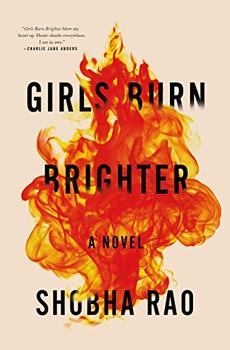Book Club Discussion Questions
In a book club? Subscribe to our Book Club Newsletter!
For supplemental discussion material see our Beyond the Book article, The Charkha and our BookBrowse Review of Girls Burn Brighter.
Please be aware that this discussion guide will contain spoilers!
- Discuss the novel's title. What does it mean to you? How is the experience of being a girl portrayed here? Did you find it eye-opening?
- Why do you think the author chose to begin with the story about the old woman and the temple doors? What tone does that set for the rest of the novel?
- How is friendship depicted in these pages? Why do you think Poornima and Savitha are so drawn to each other? What qualities do they share, and what qualities distinguish each of them? Do they change over the course of the novel?
- Savitha tells Poornima about encountering an owl on the road in Indravalli. The owl tells Savitha, "If two people want to be together, they'll find a way. They'll forge a way. It may seem ludicrous, even stupid, to work so hard at something that is, truly, a matter of chance, completely arbitrary, such as staying with someone — as if 'with' and 'apart' have meaning in and of themselves — but, the owl said ... but that's the thing with you humans. You think too much, don't you?" Discuss the owl's words. What does this novel have to say about willpower versus fate or coincidence?
- Poornima and Savitha have very different relationships with their fathers. How do those relationships shape their childhoods and their worldviews? Do you feel any sympathy or understanding toward Poornima's father?
- Savitha's last words to Poornima are "I'm the one with wings." What do you think she means by that? How are bird and flight imagery used throughout the novel?
- On her wedding night, Poornima remembers a story from childhood, when she stole a candy and her mother told her to never take what isn't hers. She reflects, "Don't you see, Amma, if only I had taken the things I wasn't meant to take. If only I'd had the courage." Are there examples after this moment in her story when she does take what she isn't supposed to? How does she exercise control over her own life?
- In her husband's house, after she has been terribly burned, Poornima imagines the banks of the Krishna river: "When she closed her eyes, there were the saris drying on the opposite shore. Every color, fluttering in the river breeze, fields of wildflowers." Saris and weaving play an important role throughout the novel. What do they
represent for Poornima and Savitha? Why does Savitha guard the fragment of cloth from Poornima's sari so closely?
- Discuss Savitha's thoughts on bananas: "Yogurt rice with a banana was like life, simple, straightforward, with a beginning and an end, while the other — the banana split — was like death, complex, infused with a kind of mystery that was beyond Savitha's comprehension, and every bite, like every death, dumbfounding." Do you think her views on life and death make her more resilient and able to face adversity?
- Savitha tells Poornima a story about a crow and an elephant, which Poornima thinks about often as she is searching for her friend. Savitha says, "Here's what matters. Understand this, Poornima: that it's better to be swallowed whole than in pieces. Only then can you win. No elephant can be too big. Only then no elephant can do you harm." What do you think she means? Do you think Poornima and Savitha are swallowed whole by their experiences? Why or why not?
- Savitha and Poornima both have complicated relationships with Mohan. Why do you think they are both drawn to him? Do you find him sympathetic?
- Poornima finds a collection of poetry in Mohan's coat, and reads the most dog-eared page, "The Love Song of J. Alfred Prufrock." When she discusses the poem with Mohan, he claims "it's about the struggle to find courage" and that his favorite lines are "And indeed there will be time / To wonder, 'Do I dare,' and, 'Do I dare?' / Time to turn back and descend the stair." Mohan tells Poornima they are both like Prufrock, but Poornima disagrees: "No, she thought, you're wrong. You're wrong. He's nothing like me." Why do you think they have such different reactions to the poem? How is courage portrayed in this novel?
- Discuss the two stories Savitha hears from the men with whom she hitchhikes: the multi-generational story that ends in the propane gas explosion, and the story about the daughter who is half black and half white. Why do you think the men decided to share those particular stories with Savitha, especially knowing that she can't understand English? What do they add to the novel as a whole?
- Girls Burn Brighter addresses some of the most difficult issues facing women and girls today: rape, domestic violence, prostitution, sex trafficking, and abuse. Did Poornima's and Savitha's stories change the way you think about these issues? Did you find the novel's ultimate message to be at all optimistic or hopeful? Why or why not?
- The novel's final scene is left ambiguous: we don't actually see if Poornima and Savitha reunite. How did you feel about the ending? What do you imagine happening to Poornima and Savitha next? Do you think there is the possibility of a new life for them in America?
Unless otherwise stated, this discussion guide is reprinted with the permission of Flatiron Books.
Any page references refer to a USA edition of the book, usually the trade paperback version, and may vary in other editions.
